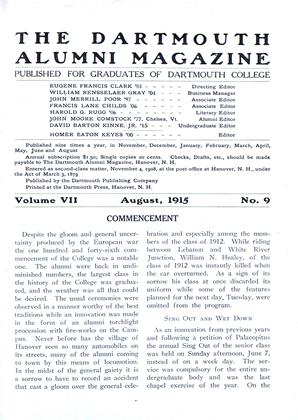BY SIDNEY L. GULICK, D.D., 1883. Fleming H. Revell Company, 1915.
Had the preachers of Europe and America been doing their full duty, had the churches made a man's acceptance of the Golden Rule in international affairs a test of his Christianity, this war would not have occurred. "Whoever is in earnest for world-peace can gain his end only as he exalts and makes universal the rule of the Golden Rule." But Dr. Gulick makes no mere preachment. Many people talk of universal brotherhood. Here is a man who, after traveling widely, working, observing, and thinking, tries to remove the stigma he himself inscribes by setting forth concrete cases and modes of action quite in accord with the teaching of Christ, "Overcome evil with good,"— modes the utility of which cannot be refuted excathedra, and which have never been tried.
"Nations great and strong must learn to respect those that are weak and small. . . . Each will rejoice in the prosperity of the rest, and the prosperity of each will promote the prosperity of all. . . . Whence, however, are these changes to come unless it be from Christ through the Church?" Dr. Gulick proposes an "Ecumenical Peace Council of Christian Churches" to be held in some European center, the Church Peace Union of America perhaps to take the lead. This is in harmony with recommendations of the World Alliance of the Churches which last August in the heart of Europe bravely held its candle against the thunder cloud.
Others are busy perfecting machinery for peace. The churches must mould the hearts and minds of men. They should see the significance of races, "and help the world to give each race that opportunity which will enable it to make its characteristic contribution to the life of the whole." While the proper government authorities must execute international policies, "the characteristic moral features should be determined by the Christian citizens of our land." This book is an appeal for effective organization of such citizens in their churches. Methods of organization and action are suggested. Peace education is urged for the young.
Dr. Gulick never lets a thing go by default of ways and means ; so he has them ready in national policies and in the attitude of the churches toward them. A western power dealing with a peaceful eastern people like the Chinese must not break its treaties. Dr. Gulick affirms that we have broken them, and that the churches—will all their apparent interest in foreign work—have not known it. We should give no people cause to think of arming against us. Let us deal justly and kindly with Japan; adopt a better policy toward aliens and race assimilation; with entire devotion put millions of dollars into Mexico for her educational and financial recovery. This is a bare indication of some of the policies proposed, and gives not at all the author's many ideas for carrying them out. The book will be in the hands of every pastor in the country, a good start toward the great influence it ought to have.
C.B.C.
 View Full Issue
View Full Issue
More From This Issue
-
 Article
ArticleCOMMENCEMENT
August 1915 -
 Article
ArticleMEETING OF TRUSTEES
August 1915 -
 Article
ArticleTHAYER SCHOOL OF CIVIL ENGINEERING
August 1915 By Robert Fletcher -
 Article
ArticleTHE COLLEGE YEAR
August 1915 -
 Article
ArticleDARTMOUTH MEDICAL SCHOOL
August 1915 By Colin C. Stewart -
 Class Notes
Class NotesCLASS OF 1895
August 1915 By ERNEST S. GILE
Books
-
 Books
BooksProfessor J. B. Stearns is the author of Epicurus and Lucretius
April 1936 -
 Books
BooksFaculty Articles
JANUARY 1965 -
 Books
BooksSEVENTY DARTMOUTH POEMS.
MARCH 1971 By A. INSKIP DICKERSON JR. '56 -
 Books
BooksBriefly Noted
NOVEMBER 1970 By J.H. -
 Books
BooksPUBLICATIONS
July 1919 By W. H. WOOD -
 Books
BooksFACULTY PUBLICATIONS
November 1918 By WILLIAM KELLY WRIGHT


